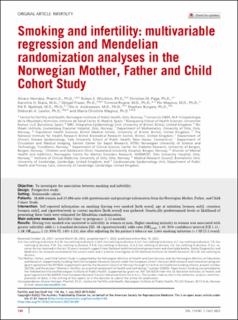| dc.description.abstract | Objective: To investigate the association between smoking and infertility.
Design: Prospective study.
Setting: Nationwide cohort.
Patients: 28,606 women and 27,096 men with questionnaire and genotype information from the Norwegian Mother, Father, and Child Cohort Study.
Intervention: Self-reported information on smoking (having ever smoked [both sexes], age at initiation [women only], cessation [women only], and cigarettes/week in current smokers [both sexes]) was gathered. Genetically predetermined levels or likelihood of presenting these traits were estimated for Mendelian randomization.
Main outcome: measure Infertility (time-to-pregnancy ≥12 months).
Results: Having ever smoked was unrelated to infertility in women or men. Higher smoking intensity in women was associated with greater infertility odds (+1 standard deviation [SD, 48 cigarettes/week]: odds ratio [OR]crude, 1.19; 95% confidence interval [CI] 1.11–1.28; ORadjusted 1.12; 95% CI, 1.03–1.21), also after adjusting for the partner’s tobacco use. Later smoking initiation (+1 SD [3.2 years]: ORcrude, 0.94; 95% CI, 0.88–0.99; ORadjusted 0.89; 95% CI, 0.84–0.95) and smoking cessation (vs. not quitting: ORcrude, 0.83; 95% CI, 0.75–0.91; ORadjusted, 0.83; 95% CI, 0.75–0.93) were linked to decreased infertility in women. Nevertheless, Mendelian randomization results were not directionally consistent for smoking intensity and cessation and were estimated imprecisely in the 2-sample approach. In men, greater smoking intensity was not robustly associated with infertility in multivariable regression and Mendelian randomization.
Conclusions: We did not find robust evidence of an effect of smoking on infertility. This may be due to a true lack of effect, weak genetic instruments, or other kinds of confounding. | en_US |

